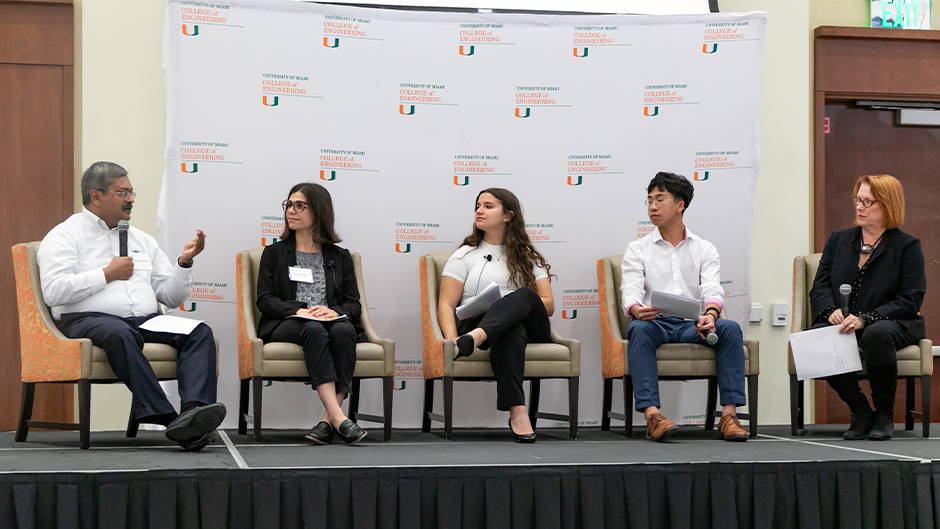Video feedback, artificial intelligence and problem-based learning were among the educational strategies highlighted at the University of Miami College of Engineering’s fifth annual Teaching and Learning Innovation in STEAM (TALIS) Day conference.
Dean Pratim Biswas, Ph.D., and associate dean Derin Ural, Ph.D., welcomed more than 50 student, faculty, and professional attendees to the April 3 conference at the Newman Alumni Center. “We welcome new approaches,” said Biswas, noting that team learning and active learning strategies have been integrated into the college’s first-year curriculum. Ural shared an update on learning outcomes from the University’s B.S. in Innovation, Technology, and Design program.
"We often look to the College of Engineering to find innovations that should be implemented university-wide,” said Laura Kohn-Wood, Ph.D., dean of the School of Education and Human Development, and director of the University of Miami Platform for Excellence in Teaching and Learning (PETAL).
In keeping with the TALIS Day theme, Ana Cancio, ’84, presented the Alexander Orr Excellence in Teaching Award to Helena Solo-Gabriele, Ph.D., P.E., professor, Department of Chemical, Environmental, and Materials Engineering.
Innovation in society
The TALIS DAY keynote talk on “Innovation – An Agent of Societal Change and for Enabling a New Breed of Engineer" was given by Jonathan Cagan, Ph.D., the David and Susan Coulter Head of Mechanical Engineering and George Tallman and Florence Barrett Ladd Professor at Carnegie Mellon University.
“Rather than a technological advance, innovation is a leap in customer value,” he said, noting the evolution of music devices from boomboxes to smart phones. “Good products enable and captivate customers,” added Cagan, who has engaged his students in high-impact product development projects and uses AI and computational resources to conduct deep data analyses.
But Cagan cautioned that engineers can’t find a product solution until they define the problem from the perspective of its stakeholders. “That means incorporating the emotional aspects such as design, along with the functionality, performance, and quality,” he said.
Faculty Presentations
Renee Evans, senior instructional designer, moderated a panel of faculty presentations, beginning with “A Rookie’s Perspective on Problem-Based Learning,” by Luis Pestana, Ph.D., assistant professor, Civil and Architectural Engineering.
“Students say they enjoy learning from real-world situations, as well as diverse team-building in an engineering atmosphere,” he said. “However, some say they learn better through lectures and don’t like the time pressure. Also, some slow learners couldn’t keep up with their group. For the future, we should think about reducing the scope of the problems, and minimizing group work outside class.”
In her presentation on “Active Learning Redesign in a Project Management Course,” Nina Miville, Ph.D., associate professor of practice, Industrial and Systems Engineering, emphasized the importance of active learning by doing. She also noted the benefits of “Girl Scout Engineering Day,” as groups of girls were introduced to engineering and design thinking in a “fun and interactive way.”
Landolf Rhodes-Barbarigos, Ph.D., assistant professor, Civil and Architectural Engineering, gave “An Engineering Perspective on the New Climate Resilience Undergraduate Course.” He spoke of the importance of introducing engineering students to climate issues, along with new forms of collaboration and problem-solving learning.
Today's students are increasingly seeking an integration of academic learning and practical experience, as highlighted by Lokesh Ramamoorthi, lecturer, Department of Electrical and Computer Engineering. In his presentation on "Impact Driven Education and Assessments (IDEA)," Ramamoorthi explains that the IDEA concept aims to merge personal and professional learning while considering the local, national, and global implications of engineering disciplines.
In his talk about “Improved Engagement and Learning through Video Feedback,” Julian Lippmann, Ph.D., lecturer, Biomedical Engineering, said video and other digital tools provide new opportunities for giving, obtaining and storing student feedback. “Video can reinforce concepts like problem-based learning and the flipped classroom,” he said. “It can also lead to better outcomes and more inclusive learning.”
Fireside chat
Dean Biswas kicked off a fireside chat on “Innovation in Teaching and Learning in Engineering,” by highlighting the college’s strategic initiatives in fields like autonomous mobility and biomedical engineering. “We also have to embrace AI and machine learning tools like Chat GPT,” he added. “I remember when the calculator was a prohibited tool in my undergraduate education. Although AI has many current limitations, it is here to stay.”
Kathi Kern, Vice Provost for Educational Innovation, agreed, noting that ChatGPT is “an amazing tool, but it is not a sentient being, it lacks a moral lens and can’t necessarily give you the truth. Ask it to write your biography and you will see what I mean.”
Lauren Rothschild, president of the Engineering Student Council, agreed with Kern, and said it’s important to integrate the college’s programs into a university-wide framework. Leonor Teles, Ph.D. student in Biomedical Engineering, focused on AI’s impact on teaching and learning, as well as future career prospects.
Reflecting on the impact of TALIS Day, Ian Alexander Lee, engineering liaison to University of Miami Student Government, said, “This is a valuable conference, and more students should hear these presentations. It is important for our faculty to keep thinking about new ways to educate and develop our students.”

